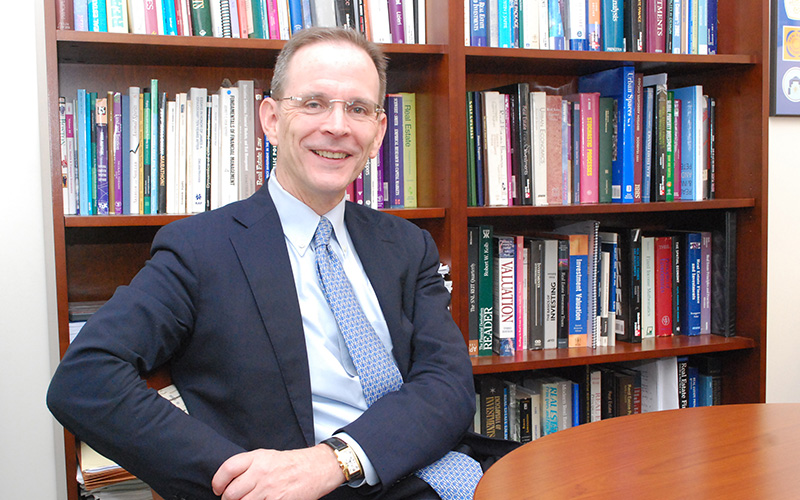Someone recently asked Driehaus College of Business faculty member James Shilling if there was still value in sending a student to school to learn real estate or business.
“It seemed to me such a straightforward question! Where else would you send a person to learn about business and to develop these human capital skills that would make you successful going forward?” says Shilling, the Michael J. Horne Chair in Real Estate Studies.

Shilling, who has been at DePaul University since 2007, says changes in the industry have made having a solid business background even more important for students. “For us in real estate, it has become much more specialized now than it was 20 years ago, so students really need to become much more specialized as well,” he explains. “What is tremendous about DePaul is that we are creating an environment where students can specialize and gain training to become tomorrow’s leaders in the real estate industry with the skills needed to be successful private equity real estate investors.”
Even as the field has changed, Shilling has remained committed to studying how finance and economics interact with real estate issues. “I always knew I wanted to do housing economics. I wanted to study with the best housing economist in the country at the time, and that was Patric Hendershott,” says Shilling, who met Hendershott while at Purdue University. Their paths have crossed again at DePaul, where Hendershott is a senior research fellow at the Institute for Housing Studies and Shilling is the institute’s academic project director.
Sharing real-world lessons
A prolific scholar, Shilling has contributed over 100 articles to journals and books. By staying connected to current trends, Shilling is able to bring the most up-to-date lessons back to his students. “It’s not hard to bring things that you’re doing on the research side into class,” he says. “We’re increasingly becoming such a global economy that students really need to know what these trends look like in order to be successful in the marketplace.”
Shilling has been busy this spring as the chairman of the organizing committee for the 2015 Global Real Estate Summit, being held in Washington, D.C., July 6-9. The summit is a joint conference of four leading real estate research associations: Asian Real Estate Society, Global Chinese Real Estate Congress, American Real Estate and Urban Economics Association and International Real Estate Society. Shilling says more than 500 researchers from all over the world will attend the conference, which is focusing on Chinese real estate.
“It’s really interesting that people around the world want to know what the trends are in Asia at the moment. You don’t have to stretch very far to make plain that there is a vast amount of capital coming into the U.S. from Asia and to show how this capital is affecting real estate markets—all you have to do is turn to New York City,” Shilling says, noting how in May a Chinese investor paid nearly $2 billion for the Waldorf Astoria in Manhattan.
Research that impacts practice
Shilling is one of the nation’s foremost authorities on real estate economics, finance and investment. His extensively published research has examined a number of topics, including real estate investment trusts and the role of real estate in institutional investors’ portfolios; housing finance, urban economics and affordable housing; mortgage securitization; commercial mortgage default and real estate asset pricing.
He also has been recognized by his peers for his research. In 2009, he was awarded the David Ricardo Medal by the American Real Estate Society in recognition of research productivity and influence. In 2007, he received the George Bloom Award, presented by the directors of the American Real Estate and Urban Economics Association for outstanding contributions to the field of real estate academics.
But research isn’t just about journal articles and recognition. For Shilling, it’s about practical applications. “I think that there are various places where state-of-the art research can have a dramatic impact on practices, both in commercial real estate as well as in housing markets and financial markets,” he says, noting his experience with finance policy through the years. “Who would have thought that 20-plus years since the savings and loan crisis of the mid-1980s we would have another financial crisis and we’d have to go back and revisit issues about what housing finance policy works best for the U.S.”
“What has been rewarding from a research standpoint is to contribute in one way or another to building a better housing finance system, or improving how commercial real estate markets operate, or showing how inefficiencies can occur when policies are not working,” he says. “I’ve been making this statement to everybody who will listen: We can’t have a strong economy until we have a strong housing market.”
Learn more about the real estate major at DePaul.
Learn more about the MBA concentration in Real Estate Finance and Investment at DePaul .
Learn more about the MS in Real Estate at DePaul.